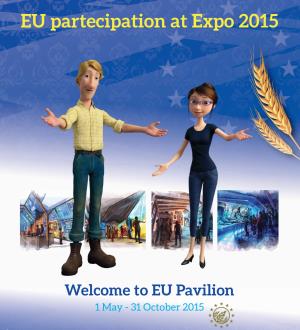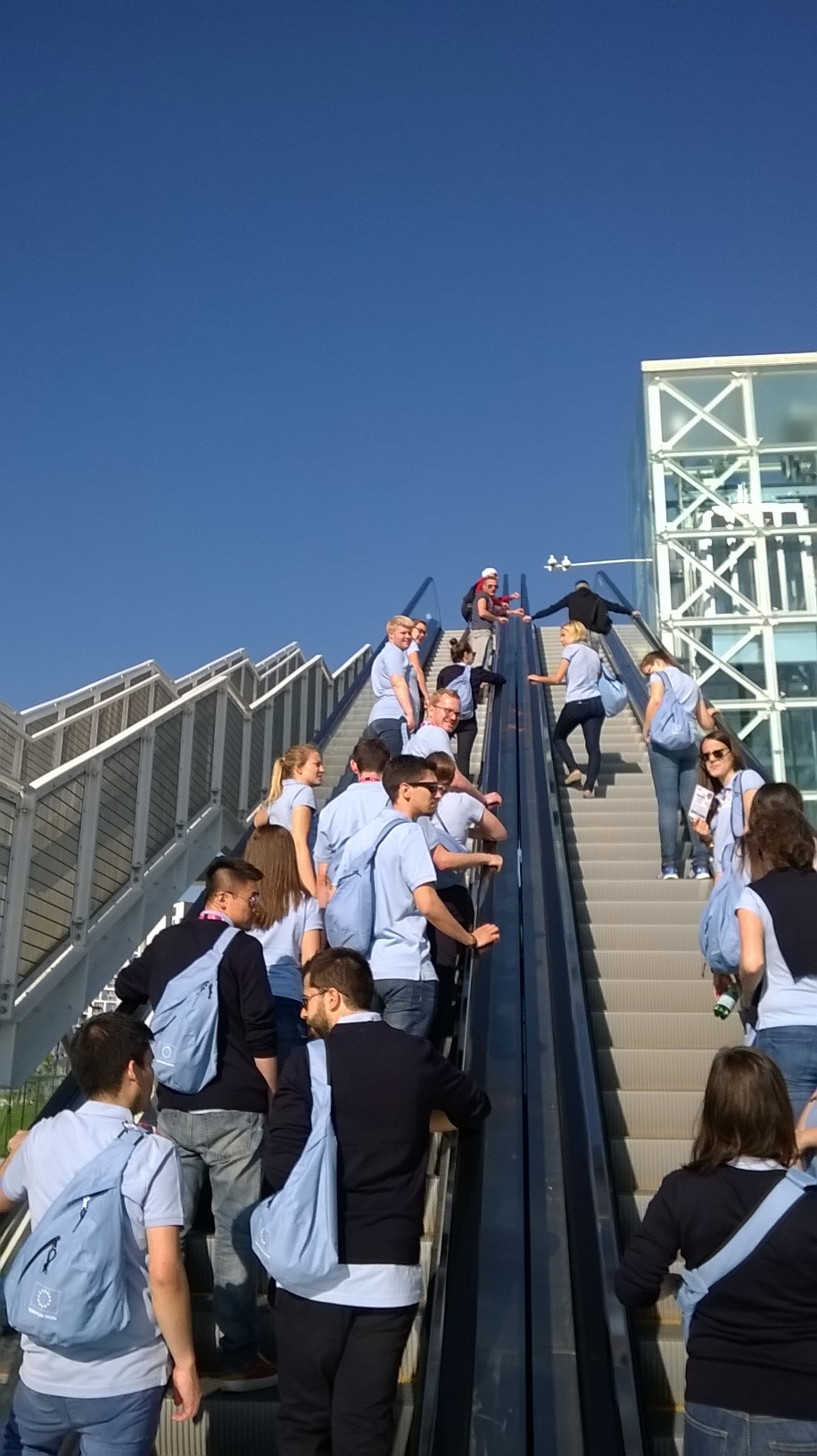Nurture the skills
here are events that change the course of history of a country and events that change the course of a person's life. And then there are events that can do both.
This is the case of the Expo: one of the biggest events held in Italy in the last century, a strategic drive to exit the economic crisis and to introduce Italian excellence to the world- and also a unique and unrepeatable experience for thousands of young and old who are working in the different halls as volunteers for Expo Milan 2015.
A way not only to be part of an international event and become the bearer of the message of acceptance and integration of the Exhibition, but also to acquire unique skills and knowledge.
A growth path that allows them to expand their experiences in a multicultural and multilingual context, to participate directly in the promotion and diffusion of active European citizenship and the issues associated with food, to build a network of relationships based on energy, talent and resourcefulness, and to develop new areas of interest and discover skills and talents not yet explored.
The "Volunteer Programme for the European Union Pavilion at EXPO" is organized by Ciessevi, the Centre for Voluntary Service of the Metropolitan City of Milan, part of the Italian CSV network, which provides voluntary organizations and citizens a range of consulting services, training, support and tutoring.
Ciessevi, in close collaboration with the EU Task Force for Expo Milan 2015, manages the process of orientation, selection and creation of groups of volunteers who participate in the experience.
Ciessevi is also the entity that will issue the Badge that will validate the prior training and the work done by nearly nine hundred youth from European countries that are volunteering at the European Union pavilion at Expo.
We spoke with Silvia Rapizza and Silvia Cannonieri of Ciessevi.

Why would a young person choose to be a volunteer at the European Union pavilion at EXPO?
Young people participating in the Volunteer Program at the EU pavilion at Expo want to, first of all, be there: to participate. At the same time they believe that this experience will enable them to increase their wealth of experience and knowledge, and to meet people; make contacts and relationships.The program has been designed from the outset to favour the youth and to ensure that the experience left them a greater awareness of being European citizens and of the opportunities that this offers them and the values conveyed by the EU Pavilion: cooperation, tolerance, union in diversity, collaboration between tradition and innovation as winning recipes for growth and development.
One of the key messages that is emphasized to the volunteers on the day before the activity begins, is that this program, like the others that the EU aims at young people, represents a real learning opportunity that produces tangible benefits-- such as the Certificate of participation issued by the EU or the Open Badge - but also intangible, ie. skills and abilities.
Four months after the inauguration of the Exhibition, what is the feedback of those participating in the project?
"Amazing, exciting, great" are the keywords most commonly used by volunteers to describe the experience in the questionnaire completed at the end.
It’s obvious, from their feedback, that the young people feel they have grown both in professional terms and personal: they feel empowered, feel they had an important role in the Pavilion and this is very motivating for them.
Being in an international context, speaking different languages, relating with other volunteers and with the staff of the European Union, dealing daily with visitors from all over the world; all this is a priceless opportunity for enrichment.
What skills are required, which does Ciessevi deliver during induction training to volunteers, and which are those that will accrue during the experience in Expo?

Crucial in the selection of volunteers is the motivation they prove that they have, together with enthusiasm, a desire to participate and get involved. The experience at the EU pavilion needs language skills, given the international nature of the event: knowledge of Italian and English, in the first place. Knowledge of other languages is an added value.
Moreover, as the number of applications received was considerably higher than that of the volunteers requested, also taken into account were relationship skills, leadership, problem solving, communication, stress management and organizational skills. As personal attributes, skills such as empathy and aptitude for the role were considered.
The online training course that all the volunteers followed before the start of the period of service offered them a wide range of information: the functioning of the European institutions and the reasons for EU participation in Expo, the Joint Research Centre e the intensive research that the EU conducts, safety rules within the exposition site, the content of the Pavilion, motivations for volunteering and approaches related to them, as well as some tips and tools for self-reflection that enable volunteers to enhance their knowledge, the values of volunteering and active citizenship.During the Expo experience, volunteers then have the opportunity to gain or strengthen some different skills, many of which are related to the field of so-called soft skills. Listening skills, openness, communication in a foreign language, teamwork, problem solving, time management, and, in the cases of volunteering team leaders, also of leadership and mediation. These constitute a valuable asset that volunteers will use in their personal and professional future.
What is the added value of being able to validate and certify these experiences through the Open Badges?
The Open Badge allows volunteers on the one hand to obtain skill recognition in the aptitudes demonstrated, on the other to make them immediately visible. The badge received will, in fact, be published by young people on social networks, on their CVs, blogs etc. and it may be circulated with ease. This perhaps is the real strength of the Open Badge, the ability to make experiences, skills and competencies acquired visible and to communicate them effectively.
Volunteering is a highly educational activity, not only from a professional point of view or cultural but also social and civil. Is it valued enough in our country? Could the institutions do more?
There is certainly, also at an institutional level, a growing awareness of the important contributions that volunteering makes to society and the protection of the common good. However, too little is being done to recognize and appreciate the work of volunteers. The volunteers themselves are rarely aware of the skills and competencies they have acquired and daily put into play. Missing are moments of insight, and, especially, the instruments that can give effective visibility, even in professional careers, to the volunteer experiences and learning load that these experiences bring with them.
It is in this context that the political authorities can and must do much more, as repeatedly asked also by the European Union. For several years it has encouraged the Member States to adopt policies and define the instruments used for the recognition and validation of skills they can use in the workforce, even if acquired in informal and non-formal learning, and the world of volunteering is fully one of these learning environments.
What about businesses? In the Anglo-Saxon model, extracurricular activities - such as sports, associations and volunteering - are considered extremely important because they enrich the curriculum with transferable skills useful in the workplace. Is the same true in Italy or should we make a cultural leap on this aspect?

In the private sector we can find a great variety: from subjects for whom sensitive, personal training are very important and consider extracurricular activities also valuable, to subjects who focus only on formal training courses and/or professional experiences. The majority of private entities lie probably in an intermediate position between these two extremes, with a certain prevalence towards the second type described.
Public institutions must work to raise awareness among companies and private entities to broaden their horizons when evaluating applications received, but this jump, this important cultural transformation, will only be possible if accompanied by the preparation and dissemination of valuable tools and measures, effective enough to recognize and value the learning that occurs in extra-curricular contexts.
Could tools like Bestr, the Open Badges, and the ePortfolio be the right vehicle to enable volunteering to be perceived as a strategic driver of personal and social development?
Perhaps it is still too early to tell, but we believe that the development of the Open Badges, their circulation and visibility in the Bestr platform and their possible future integration with a Digital Portfolio may contribute to a decisive change in the perception of volunteering: not only meritorious activities in favor of the other, the community and the common good, but a tool for growth and personal enrichment in terms of acquisition of practical skills and quality expertise that often become decisive in the selection of staff – at the same level as professional experiences and formal training.
Obviously, much will depend upon the rigor and seriousness of the criteria that will be identified and shared within individual Open Badges to recognize, value and sometimes "measure" a specific skill and/or experience in the field of volunteering. That said, we believe that the Open Badges could become an important ally of the volunteer community and the recognition of its value.
- The Badge "Ambassador for EU Pavilion EXPO 2015"
- The Badge "Volunteer Team Leader for EU Pavilion EXPO 2015"
- CIESSEVI project with Bestr for Expo volunteers at EU Pavillion